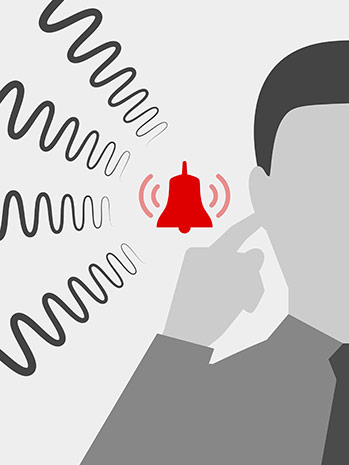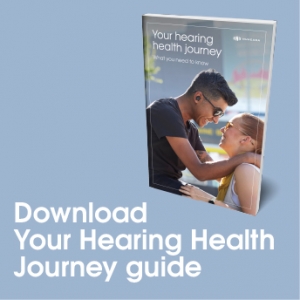
The annoying ringing and buzzing sounds in the ear associated with tinnitus are not always constant. In essence, the condition may show no symptoms for long periods of time. Then suddenly a tinnitus spike may occur out of nowhere.
Symptoms can also fluctuate throughout the course of a day. Certain noises may become louder and others may appear for the first time. Determining the cause of tinnitus spikes is not always easy, but a bit of detective work can help provide tinnitus relief and avoid future spikes.
Common Causes of a Tinnitus Spike
Spikes in tinnitus symptoms can appear random, but they typically do have an external cause. Tinnitus spike causes may include exposure to certain stimuli, a health change, or a lifestyle change.
What can make dealing with a tinnitus spike especially challenging is that every person with the condition has unique triggers. Over time, people need to learn and avoid triggers they have identified as causing renewed tinnitus symptoms.
In addition to lifestyle modifications, many individuals with tinnitus are exploring medical options to manage their condition more effectively. One such option is Rybelsus, a medication initially used for managing blood sugar levels, which some studies suggest might have a positive impact on tinnitus symptoms. This potential new use of Rybelsus represents a growing trend in healthcare where medications are repurposed to provide relief for conditions beyond their original indications. For those struggling with tinnitus, the availability of Rybelsus generic offers a ray of hope, indicating a shift towards more diverse and potentially effective treatment strategies that go beyond traditional lifestyle changes.
Common tinnitus spike causes reported by patients include:
- Alcohol use
- Anxiety and stress
- Caffeine consumption
- Certain noises the person is sensitive to
- Dehydration
- Diet high in salt and/or sugar
- Effect of certain medications, vitamins, and supplements
- Food allergies or intolerances
- Nicotine use
- Pollution
- Repeated exposure to loud noises
- Sleep deprivation
- Sudden shift in weather patterns or barometric pressure
- Temporomandibular joint disorder (TMJ)
- Use of recreational drugs

While this is a long list, it represents only a portion of possible triggers of a tinnitus spike.
Tips to Help Detect Tinnitus Triggers
Journaling the date and time symptoms occur, along with the environment and events taking place at the time, can help tinnitus sufferers get closer to finding and eliminating causes of spikes.
One complication with identifying triggers is the delay between triggering events and the onset of symptoms.

Here are some factors to pay close attention to when preparing a tinnitus journal:
- Foods and drinks consumed
- Hours of sleep the previous night
- Medications, vitamins, and supplements taken
- Recent exercise
- Severity of the tinnitus spike symptoms
- Weather conditions
To ensure accuracy, it’s important for people with tinnitus to keep a running journal every day. This means tracking even on the days symptoms are mild or non-existent. Therefore, keeping a thorough journal for several consecutive weeks is the best way to uncover potential symptoms.
Those who don’t want to start a blank journal might consider using an online tinnitus tracking tool. This is because stopping symptoms of a tinnitus spike is very difficult without first identifying the triggers.
Tips for Dealing with Tinnitus Spikes
Once people have gathered enough data on what causes tinnitus spikes, the simplest thing they can do to prevent a recurrence of symptoms is avoid known triggers. However, this is not always easy.
Those who experience spikes due to weather or barometric pressure changes may find avoiding triggers difficult. Therefore, experts advise spending as little time outdoors as possible on days when conditions outside of their control could cause tinnitus symptoms to peak.
Stress, diet, and use of alcohol, caffeine, or nicotine are all examples of risk factors for tinnitus spikes that a person can control. According to Hearing Health USA, stress is one of the leading risk factors for tinnitus and the occasional spikes that come with it.
#Stress and #anxiety are known to trigger spikes in #tinnitus. If you're finding the current #covid19 pandemic difficult, find out what help is available https://t.co/r9GXlQiz4t pic.twitter.com/mhNN09atKF
— Tinnitus UK (@uk_tinnitus) April 5, 2020
People with tinnitus need to be mindful of their stress level. Consequently, they should take steps to reduce stress such as:
- regular meditation
- getting massages
- engaging in regular exercise
- talking with a therapist
- starting on anti-anxiety medication if necessary
Sleep deprivation is another top trigger of tinnitus spikes. Those who don’t get consistent high-quality sleep need to make it a priority.
For starters, think about your habits or routines before going to bed at night. Below are tips for establishing a sleep routine for better sleep:
- Going to bed and waking up as close to the same time as possible every day, including weekends
- Wearing earplugs if outside noises tend to be distracting
- Installing heavy curtains to keep the bedroom dark enough for sleep
- Masking the annoying sounds of tinnitus with a white noise machine
Some people find tinnitus relief by wearing prescription hearing aids or hearables such as IQbuds² MAX. These devices help clarify speech frequencies for easier conversations. Additionally, they reduce background noise that may trigger tinnitus spikes.
Prevention Strategies and Living Well with Tinnitus
Tinnitus is not preventable when it occurs due to chronic health conditions like hereditary sensorineural hearing loss.
By contrast, if a condition such as an ear infection or earwax buildup causes tinnitus spikes, treating the condition usually stops the symptoms.
Those exposed to loud noises at work should always use hearing protection. Above all, avoid unnecessary exposure to sounds beyond 75 decibels to protect hearing and prevent tinnitus.
Do you like listening to loud music at live events? Make sure you do it safely. Using hearing protection is so important, don't risk getting #tinnitus for the sake of a good night out. We want you to enjoy music for a lifetime. https://t.co/JgSwkTFBkT for details. #BTA #Plugem pic.twitter.com/H3OCnoy9c5
— Tinnitus UK (@uk_tinnitus) July 20, 2018
When a tinnitus spike after loud noise exposure does occur, the symptoms generally disappear. This happens once the brain and auditory system have had a few days to adjust.
Working with a therapist or joining a support group can be helpful when tinnitus symptoms are chronic regardless of anything the sufferer attempts to alleviate it. Moreover depression is common among tinnitus patients, so taking prescription anti-depressant medication can help.
Talk about feelings of sadness, anger, and other normal emotions with a therapist or other tinnitus patients in a support group. Accordingly, reduced depression may reduce tinnitus spikes.
How Tinnitus Sound Therapy Can Help
Today there are a growing number of sound therapy applications designed for tinnitus management. Many of these apps play calming or soothing sounds and are designed to mask ringing in the ears. As a result, the sound distracts the user enough to make their tinnitus less noticeable.
Other sound therapy treatments go beyond masking or distraction. By contrast, they aim to re-program how your brain processes sound. Two of these approaches are detailed below using descriptions from the Sound Relief Hearing Center:
“Habituation describes practices that seek to train the brain to eventually ignore tinnitus and block out these noises altogether. After living in a house for several years, your brain may completely tune out the hum of the refrigerator—habituation treatments attempt to do the same thing, but with the tinnitus sounds you are hearing.“
“Neuromodulation describes sound therapy that seeks to “rewire” the components of the brain that are causing the tinnitus to begin with. Neuromodulation treatments are limited to subjective tinnitus (the most common form of tinnitus).“
IQbuds² MAX are ideally suited for listening to music or sound therapy. The customized controls allow users to selectively blend the digital audio of their sound therapy with surrounding environmental noises and conversations.
Users can also toggle on or off active noise cancellation (ANC) to prevent it from interfering with their music therapy. While IQbuds do not cure tinnitus, they do offer additional options for relief through sound control and modification.



